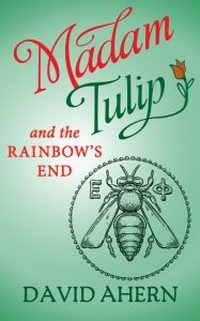 Madam Tulip and the Rainbow’s End
Madam Tulip and the Rainbow’s End
by David Ahern
DETAILS: Series: Madam Tulip, #5 Publisher: Malin Press Publication Date: March 1, 2022 Format: eARC Length: 274 pgs. Read Date: March 5-8, 2022

Yeah, okay, the post title is pretty lame. It’s the best I can come up with. Let’s move past that, okay?
What’s Madam Tulip and the Rainbow’s End About?
Thanks to a series of events that probably rings true for many struggling actors, Derry and Bruce find themselves stranded by the touring company they’d been a part of without funds and a pretty hefty hotel/bar tab. One thing leads to another, and Derry finds herself suiting up as Madam Tulip to do some fortune-telling at a charity event to work off this debt.
She’s happy to do that for a few reasons—it seems that Derry’s trying to cut back on her Tulip work, and really only does it for charities anymore. This time, she can do it for her own benefit and a charity, so she’s okay with that.
As she’s wont to do, as Madam Tulip she befriends a couple of women—one local, and one fellow American (who turns out to employ the local woman). Both women have recently had family members die, and are still grieving. The local woman comes to Madam Tulip for confirmation of her suspicion that her brother was murdered—which Tulip gave her without realizing it. The other woman’s father was supposed to leave her a large amount of money, but didn’t—her focus isn’t on the money as much as it is on understanding what happened (which makes it so much easier to like her).
Having confirmation of her brother’s murder, Mary Jo sets out to prove it and find the murderer—Derry’s friend, Bruce, is going to prove more useful than his psychic bestie on this front and is happy to try. Being able to look at things more objectively, Derry’s able to suggest a thing or two to Lena that might help her find the closure she needs.
Given the nature of a cozy mystery novel, obviously, it won’t be long until Derry finds herself more caught up in the efforts of both women to get the answers they seek—and a little more peril than any three of them expected.*
* Although by this point, Derry should know better—even without any psychic abilities..
Derry’s Gift
Derry’s abilities that stem from being the daughter of a seventh son of a seventh son have gotten her into (and out of) plenty of trouble in the past few books—but they’re never enough by themselves. Derry’s got to figure things out and take advantage of the information she gains—and frequently needs an assist from Bruce for those things that those abilities can’t cover.
This time out, she doesn’t get to take advantage of that gift too much—there are a couple of tarot readings that help her friends (and maybe some of the other readings she does in between those, but we don’t see them). But that’s pretty much it—the rest comes from Derry putting on her metaphorical deerstalker and sussing things out for herself (talking things over with Bruce helps, too).
I think I like it better this way—Derry’s never used her psychic (or whatever) capabilities as a crutch to get to the bottom of things. But the further she gets from that, the better for me.
(although, I can’t imagine I’d complain too loudly if Book 6 or 7 has Derry acting more like Jean Grey/Professor X than Jessica Fletcher)
Jacko Off-the-Grid
You can’t have a Madam Tulip novel without Derry’s father, Jacko, turning up to make things interesting. This time, fresh off a new variety of financial woes (for him, anyway), he decides to rent out his home and go live on an isolated island for a while—to reconnect with his art and avoid the distractions of technology and the city.
Neither Derry nor her mother have a lot of faith that this is going to work too well. But Derry wants to give him the chance and refuses when her mother tries to enlist her to stop him.
In the end, Jacko’s storyline brushes up against Derry’s in a few places, but in more of a “what a small world” kind of way. The two barely interact with each other, and Jacko’s never part of the main action. This is a good use of the character, who is prone to taking over the books (in an entertaining way, but a bit too dominant). Here he gets to go full-on with his antics without impacting the main story—that’s perfect.
So, what did I think about Madam Tulip and the Rainbow’s End?
At this point, getting a Madam Tulip book is a chance to spend time with some friends—with all the warmth, comfort, and pleasantness that comparison brings to mind. Ahern’s got his world and characters down pat now, and the novel moves like clockwork.
This isn’t the same old-same old by any means, however. As he mentioned in our Q&A about this book, Derry not only has to solve a crime this time but there’s a puzzle, too.
Madam Tulip and the Rainbow’s End gives you everything you want in a cozy mystery—good characters, a grin or two, a clever mystery or two, a well-constructed story, and a diverting read for a couple of hours. As expected from this series/author, I’m glad to recommend it to you.
I know Madam Tulip #6 is on the way, and I’m looking forward to it—and hopefully, several more before people in Ireland figure out that they need to stop inviting the fortune teller to their events if they want things to go smoothly (especially nefarious things).
Disclaimer: I received this eARC from the author in exchange for this post. I thank him for that, but the opinions expressed are mine.

![]()


